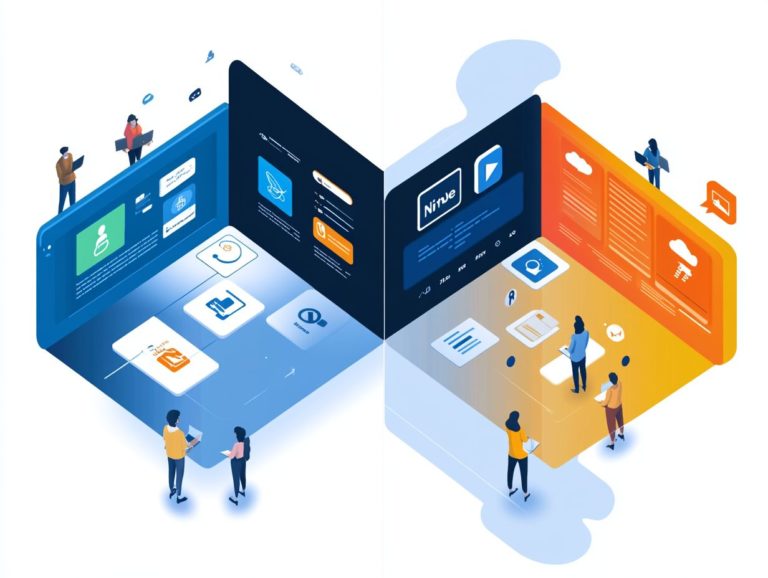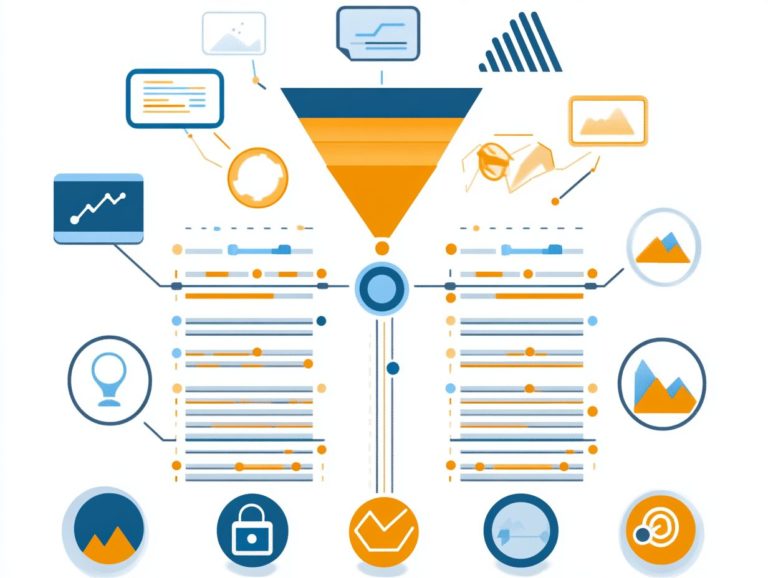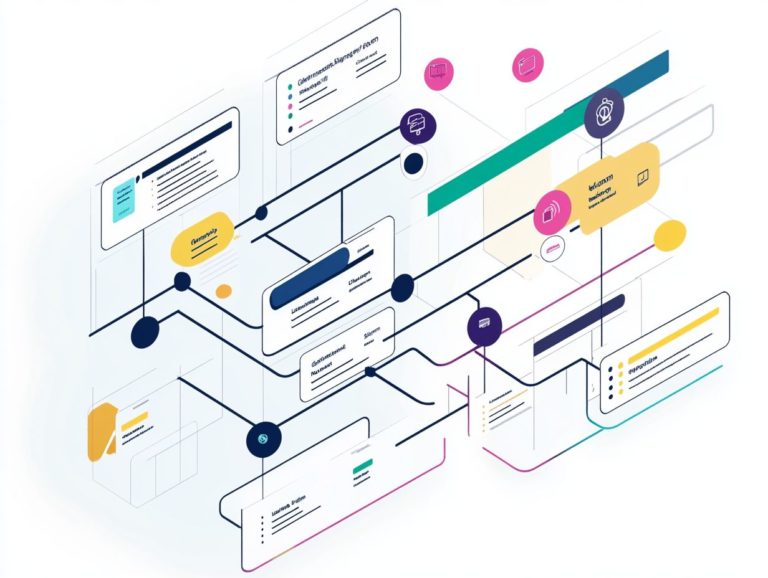Top 5 CRMs for Performance Tracking
In today s fast-paced business landscape, effective performance tracking is crucial for success. A strong Customer Relationship Management (CRM) system streamlines this process, offering insights that drive growth and efficiency.
This article explores the top five CRMs HubSpot, Salesforce, Zoho, Insightly, and Pipedrive. You’ll discover what makes a CRM effective, common implementation challenges, and future trends to watch.
Learn how the right CRM can elevate your performance tracking strategy!
Contents
- Key Takeaways:
- 1. HubSpot CRM
- 2. Salesforce CRM
- 3. Zoho CRM
- 4. Insightly CRM
- 5. Pipedrive CRM
- What Is a CRM and Why Is Performance Tracking Important?
- What Are the Key Features to Look for in a CRM for Performance Tracking?
- How Can a CRM Help Improve Performance Tracking?
- What Are the Different Types of CRMs Available?
- What Are the Pros and Cons of Using a CRM for Performance Tracking?
- How Can a Business Choose the Right CRM for Their Needs?
- What Are the Common Challenges in Implementing a CRM for Performance Tracking?
- How Can a Business Maximize the Benefits of Using a CRM for Performance Tracking?
- What Are the Future Trends in CRM and Performance Tracking?
- What Are the Potential Pitfalls of Using a CRM for Performance Tracking?
- How Can a Business Measure the Success of Their CRM and Performance Tracking Efforts?
- Frequently Asked Questions
- What are the top 5 CRMs for performance tracking?
- What makes Salesforce a top choice for performance tracking?
- Is HubSpot suitable for small businesses looking for performance tracking?
- Can I integrate Zoho CRM with other performance tracking tools?
- How does Pipedrive help with performance tracking?
- Does Insightly offer any features specifically for performance tracking?
Key Takeaways:
HubSpot, Salesforce, Zoho, Insightly, and Pipedrive are the top 5 CRMs for performance tracking. These systems help businesses track and improve performance with key features like customizable dashboards and real-time data analysis.
Choosing the right CRM and addressing implementation challenges are essential for maximizing benefits.
1. HubSpot CRM
HubSpot CRM offers a user-friendly solution for sales teams eager to enhance customer relationships. It combines powerful marketing automation, allowing seamless campaign management while targeting specific demographics.
Efficient lead management helps you track interactions effectively, reducing overhead and maximizing conversions. It also consolidates customer data from various touchpoints, giving you a complete view for better decision-making.
HubSpot offers competitive pricing for all business sizes, making it an accessible choice for organizations looking to grow.
2. Salesforce CRM
Salesforce Sales Cloud is a leading CRM solution, known for its exceptional customer service and sales efficiency. It provides cloud-based tools that enhance your sales pipeline.
Advanced sales tracking lets you monitor leads and opportunities in real time, ensuring no potential sale is missed. With integrated reporting and analytics, you gain insights for informed, data-driven decisions that boost conversion rates.
Salesforce’s communication tools streamline interactions, nurturing strong relationships with clients. Its adaptability makes it suitable for startups and large enterprises alike.
3. Zoho CRM
Zoho CRM is a complete system that features automation and excellent customer engagement tools. It’s perfect for businesses seeking customizable solutions.
Impressive lead management ensures potential customers receive nurturing from the first contact to conversion. A/B testing helps optimize marketing strategies for maximum engagement.
Accessibility is a highlight, with a mobile app allowing deal management and performance tracking on-the-go. Zoho’s integrations with other applications enhance functionality, aligning with your unique business processes.
4. Insightly CRM
Insightly CRM serves as a customer relationship management (CRM) solution designed to enhance your operations by providing valuable data insights and effective sales forecasting, enabling you to manage customer interactions and enhance your overall performance.
With its comprehensive pipeline management tools, you can effortlessly track the progress of sales opportunities in real time. This organized approach boosts your efficiency and ensures that no lead goes unnoticed.
The robust historical data analysis capability enables your team to identify trends and make informed decisions, leading to a more strategic approach in your operations.
This combination of features significantly elevates customer satisfaction, allowing you to respond swiftly to customer needs and preferences.
Its intuitive interface and user-friendly design make it an ideal choice for small to medium-sized businesses seeking to optimize their processes without overwhelming their teams.
5. Pipedrive CRM
Pipedrive CRM is the perfect tool to supercharge your sales efforts, designed to elevate your sales tracking game with intuitive visual charts and an exceptional user experience. It’s no wonder sales teams gravitate toward it.
With its powerful tools to manage your sales process, you can effortlessly navigate through the various stages of your deals, ensuring that no opportunities slip through the cracks. This organized approach not only boosts your efficiency but also paves the way for timely follow-ups, allowing you to concentrate on closing deals instead of getting bogged down by administrative tasks.
Boost your sales today with its powerful features! Pipedrive offers a competitive pricing structure that ranges from basic to advanced plans, perfectly catering to your diverse business needs.
Its seamless integration with popular tools like Slack, Google Workspace, and Zapier further enhances collaboration, enabling you to work smarter and streamline your processes without disrupting your existing workflows.
What Is a CRM and Why Is Performance Tracking Important?
A CRM, or customer relationship management software, is essential for you to effectively manage customer data and interactions. Performance tracking is a critical aspect of optimizing your sales efficiency and enhancing customer satisfaction.
This powerful tool offers you valuable insights into customer behaviors and preferences, enabling you to tailor your marketing strategies and boost engagement.
By streamlining communication across departments, it fosters collaboration and ensures that customer queries are addressed promptly.
Ongoing analysis of performance metrics will reveal trends that can guide your decision-making, leading to smarter resource allocation.
When leveraged effectively, a CRM enhances customer retention by anticipating client needs and delivering personalized experiences, ultimately driving loyalty and fostering long-term relationships.
Thus, understanding and utilizing a CRM’s functionalities can significantly elevate your business’s overall success in today s competitive landscape.
What Are the Key Features to Look for in a CRM for Performance Tracking?
- Customizable solutions
- Robust reporting analytics
- Effective communication tools
When you re on the hunt for a CRM to elevate your performance tracking, it s essential to carefully assess these key features.
Incorporating sales forecasting tools can enable your team to predict future sales trends based on historical data, which is crucial for strategic planning.
Task automation capabilities will streamline your workflows, allowing your sales professionals to focus on nurturing relationships instead of getting bogged down by repetitive tasks.
Managing historical data becomes invaluable, offering rich insights into customer behaviors and past interactions that can shape your future strategies.
A user-friendly interface is also critical; it ensures your team members can navigate the platform effortlessly without facing a steep learning curve.
Moreover, mobile accessibility lets your sales teams manage tasks and access vital information on-the-go, making them more agile and responsive in today’s fast-paced market.
How Can a CRM Help Improve Performance Tracking?
A CRM can greatly improve performance tracking. It automates tasks, consolidates customer data, and provides insights into your sales process.
Logging every interaction emails, calls, or meetings gives your sales team a full history of customer engagements. This way, no crucial touchpoint is missed.
Advanced reporting features reveal which activities yield the best results. Your team can then tailor their strategies effectively.
With AI assistants, the process becomes even smoother. These tools analyze customer behavior, predict needs, and suggest the best times for follow-ups, making your sales efforts more strategic and successful.
What Are the Different Types of CRMs Available?
There are three main types of CRMs: operational, analytical, and collaborative. Each serves specific business needs.
Operational CRM focuses on automating customer interactions. For example, a retail company can use it to improve sales and customer support.
Analytical CRM dives deep into data, helping you understand customer behavior. A marketing agency might use it to identify trends and adjust campaigns.
Collaborative CRM enhances communication between departments and stakeholders. This is vital for healthcare providers, as it improves coordination among medical staff.
What Are the Pros and Cons of Using a CRM for Performance Tracking?
Using a CRM for performance tracking has many benefits, like better data insights and customer engagement. However, there are drawbacks to consider.
While it can boost sales efficiency and customer retention, challenges like high costs and complex integration may arise.
Many organizations find that CRM software streamlines operations significantly. Still, weigh these benefits against the learning curve and initial investment.
To maximize CRM advantages, invest in training for your team. Regularly assess your needs to customize the system for peak performance.
How Can a Business Choose the Right CRM for Their Needs?
Choosing the right CRM requires careful thought. Consider your specific needs, pricing options, and how much customization you need.
It s also crucial to think about scalability, especially if you’re part of a growing business.
User experience matters too. A simple interface helps your staff adopt the system easily without extensive training.
Integration with existing tools enhances efficiency and improves data accuracy. Aligning the CRM features with your goals is essential for supporting growth and adapting to changes.
What Are the Common Challenges in Implementing a CRM for Performance Tracking?
Implementing a CRM for performance tracking can come with challenges such as user experience hiccups, data consolidation hurdles, and pushback from sales teams set in their traditional ways.
These obstacles can serve as significant roadblocks, diminishing the potential advantages of the software.
To navigate these challenges effectively, it’s crucial to prioritize comprehensive training programs. These programs should familiarize users with the new system and address any concerns or misconceptions they might have.
Choosing user-friendly software tailored to your sales team’s needs can also facilitate a smoother transition.
Providing ongoing support will help users feel confident as they adapt to the new tools, ultimately enhancing productivity and performance!
How Can a Business Maximize the Benefits of Using a CRM for Performance Tracking?
To truly harness the benefits of a CRM for performance tracking, focus on fully utilizing its features and ensuring that all users are on board. Consistently analyze data insights to guide your decision-making.
This means implementing regular training sessions for your team so everyone becomes proficient with the system. Setting clear goals that align with your overarching business objectives instills a sense of purpose and accountability among team members.
By leveraging CRM analytics, you can gain invaluable insights into customer behaviors, preferences, and trends. This allows you to refine your strategies and cultivate stronger relationships.
Regularly reviewing these insights and adjusting your tactics will enable you to ensure that your CRM efforts continuously drive improvement and foster meaningful engagement with clients.
What Are the Future Trends in CRM and Performance Tracking?
The future of CRM and performance tracking is set to evolve dramatically. Trends like AI assistants, enhanced automation, and a stronger focus on data-driven decision-making are leading the charge!
As you recognize the importance of personalized customer experiences, you’ll notice a significant shift toward integrating predictive analytics, which means foreseeing client needs based on previous behaviors.
The rise of real-time data utilization enables you to refine your customer engagement strategies, ensuring that your interactions are timely and relevant, truly resonating with your audience.
Incorporating artificial intelligence streamlines various processes, facilitating intuitive insights that enable well-considered choices and enhance your overall performance.
What Are the Potential Pitfalls of Using a CRM for Performance Tracking?
While CRMs undeniably provide significant benefits for tracking performance, be aware of potential pitfalls that could impede their effectiveness, such as data management complications, user resistance, and over-reliance on technology.
If your team lacks adequate training, they may not fully utilize CRM features, resulting in missed opportunities for valuable insights and improved efficiency.
Additionally, poor data quality can undermine decision-making, making it crucial to establish robust data governance practices. Without strategic alignment between CRM usage and overarching business goals, efforts may become disjointed and ineffective.
To overcome these challenges, organizations should prioritize ongoing training programs, implement stringent data quality checks, and ensure that all CRM initiatives align closely with strategic objectives.
By proactively addressing these pitfalls, you can significantly enhance the value derived from your CRM systems.
How Can a Business Measure the Success of Their CRM and Performance Tracking Efforts?
Want to ensure your business thrives? Start by measuring your CRM’s success!
To measure your CRM’s success, establish clear metrics. Analyze customer satisfaction and regularly assess sales efficiency.
Focus on important performance indicators like customer retention rates, which show how well you keep your customers, and sales growth, which reflects your organization s ability to thrive in a competitive market.
User engagement metrics are equally vital, providing insights into how effectively you interact with your customers. Use tools like Google Analytics and CRM software with reporting features to measure and analyze performance effectively.
Frequently Asked Questions
What are the top 5 CRMs for performance tracking?
The top 5 CRMs for social media management are Salesforce, HubSpot, Zoho CRM, Pipedrive, and Insightly.
What makes Salesforce a top choice for performance tracking?
Salesforce is considered one of the top CRMs for performance tracking due to its comprehensive features such as customizable dashboards, real-time performance tracking, and advanced reporting capabilities.
Is HubSpot suitable for small businesses looking for performance tracking?
Yes, HubSpot is suitable for small businesses as it offers a free version with basic performance tracking features and affordable paid plans with more advanced features.
Can I integrate Zoho CRM with other performance tracking tools?
Yes, Zoho CRM has a wide range of integration options with popular performance tracking tools such as Google Analytics and Mailchimp.
How does Pipedrive help with performance tracking?
Pipedrive offers visual pipeline and activity reports, goal tracking, and sales forecasting tools that help businesses track their performance and make data-driven decisions.
Does Insightly offer any features specifically for performance tracking?
Yes, Insightly has a Performance Dashboard that allows businesses to track key metrics, set goals, and monitor their performance in real-time. It also offers advanced reporting and analytics features.






